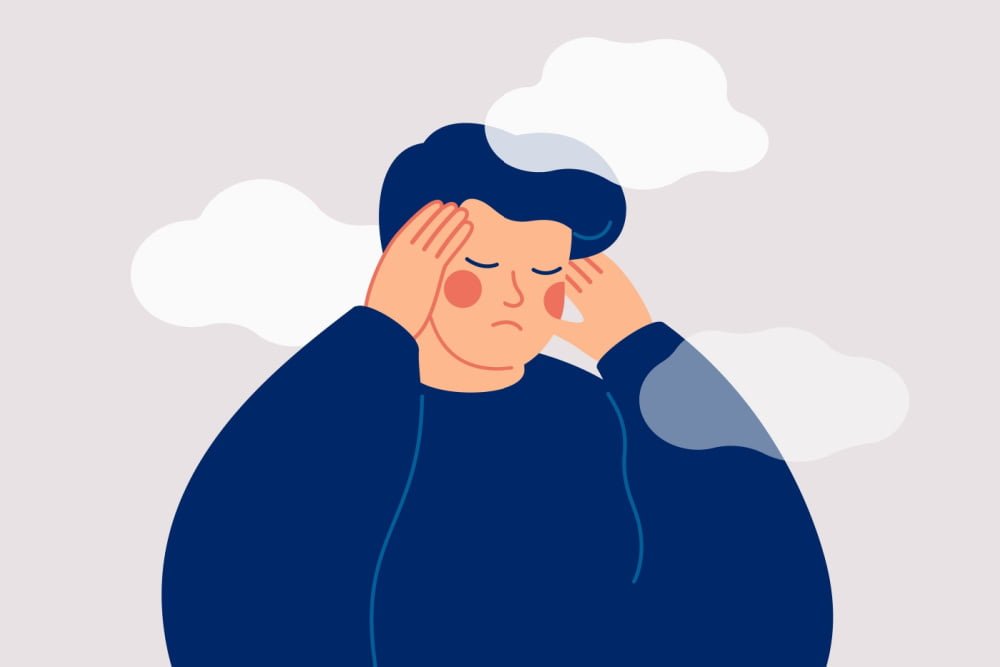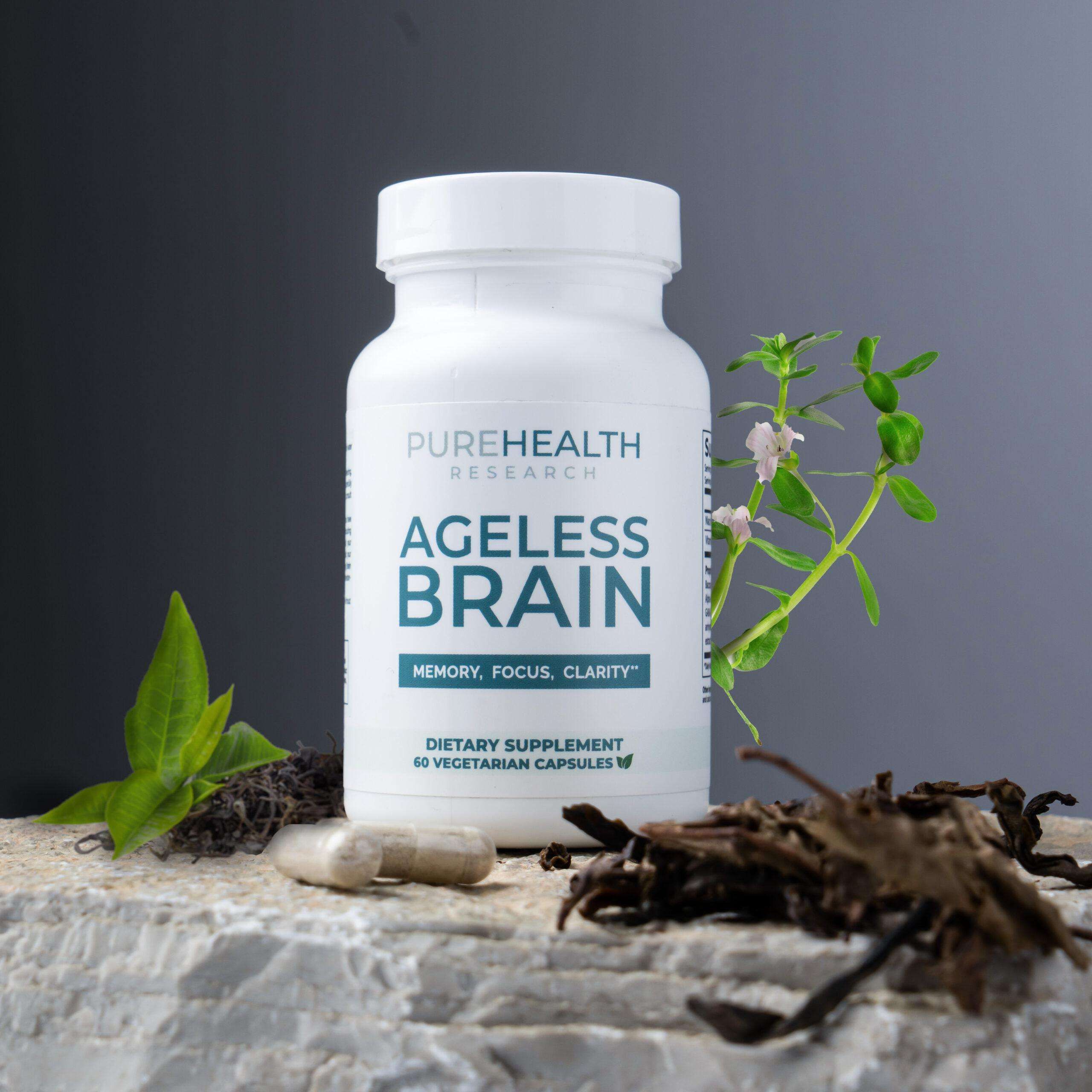How to Get Rid of Brain Fog in 6 Ways
Wondering how to get rid of brain fog? Discover simple lifestyle changes, diet tips, and supplements to regain mental clarity today!


You’ve felt it. It’s awful. So, now you need to know how to get rid of brain fog. Brain fog is no joke, and you can’t function well when it’s taking over. Usually, it’s a sign that something is “off” in your body, or it could be a side effect of a medical condition or medication you’re taking. There’s good news, though! No matter the cause, there are several ways to eliminate brain fog and take back control of how well you tackle your days.
What Is Brain Fog?
You walk into a room and suddenly can’t remember why you went there or what that super important task was that was just on your mind. Or perhaps you’re trying to pull a word out to finish a sentence, and you simply can’t complete the thought. Maybe your brain just feels a little fuzzy or sluggish, similar to the feeling you get if you need to catch up on a good amount of sleep.
What Causes Brain Fog?
Brain fog, a term used to describe cognitive difficulties such as lack of focus, clarity, and memory, can be caused by a variety of factors. People who experience this condition often:
- Follow poor dietary habits: Unhealthy food choices, high in sugar and unhealthy fats, can impact cognitive function and cause brain fog. Balanced nutrition is vital for optimal brain health.
- Lack sufficient physical exercise: Regular physical activity increases blood flow to the brain, helping to sharpen your awareness and cognitive functions. A sedentary lifestyle may contribute to brain fog.
- Do not hydrate adequately: Dehydration can impair concentration and other cognitive functions. Our brains need an optimal amount of hydration to perform effectively.
- Overwork without taking necessary breaks: Long hours of continuous work without taking breaks can lead to burnout and cognitive fatigue, often experienced as brain fog.
- Have deficiencies in specific vitamins and minerals: Certain nutrients, such as B-vitamins, Omega-3 fatty acids, and antioxidants, play a crucial role in cognitive health. Deficiencies in these nutrients can cause brain fog.
Understanding these underlying causes is the first step toward managing and improving brain fog. In the following sections, we’ll explore lifestyle changes, dietary improvements, and potentially the incorporation of specific supplements for brain and mental health, to help clear the fog.
How to Get Rid of Brain Fog
These ideas for how to get rid of brain fog have been touted as some of the best. Each one will give you the reason why the sluggishness is taking over and how to cure the brain fog so you can get back to being your normal, active, intelligent self.
1. Exercise Regularly
It might feel like your brain fog affects your body, too. You feel sleepy, lethargic, and like you just can’t handle one more thing. And now, we’re going to tell you to add exercise into the mix. It sounds counterintuitive, but exercising actually increases energy! It gives your body endorphins and dopamine, which make you feel good about yourself and the world around you.
Exercise doesn’t have to mean a gym membership, a second wardrobe, or hours spent away from home, either. Even just walking around the block after dinner, taking the stairs instead of the elevator, or doing some light stretches upon getting out of bed can make a big difference in the way your body—and your brain!—feel.
At work, try standing up and walking the office halls every hour or two. This will refresh your body and help with how to get rid of brain fog fast, keeping you focused. See if you can push for standing desk options in your office, too, or even an exercise ball instead of a chair!
2. Add Supplement to Your Routine
PureHealth Research has a proprietary blend of vitamins, minerals, and nutrients to help get rid of brain fog. This supplement for brain fog is called Ageless Brain and it will make you feel energized, competent, and back to your regular self!
This supplement, recommended by Dr. Holly Lucille, ND, is made of components that are all tested and proven to have positive effects toward a healthy brain, such as:
- Vitamin B3
- Vitamin B6
- Niacin
- Green tea extract
- Bacopa aerial extract
3. Choose Foods That Fight Brain Fog
The saying is true: You are what you eat. When we consume an abundance of processed, fatty, nutritionally lacking foods, our brains don’t get the vitamins, minerals, and nourishment that they need to perform at their best levels.
Brain fog that’s caused by what you eat (or what you don’t) is one of the most common causes of sluggishness, sleepiness, and lack of focus. However, because you’re completely in control of what you eat, this one is an easy fix!
First, stay away from processed and refined sugars. Sugar, or glucose, is an important fuel for your body and brain. However, sugar from processed foods (not from natural fruits and vegetables) gives you a rush and then brings you crashing down.
Symptoms of low-glucose-related brain fog are also often joined by:
- Mood swings
- Tiredness
- Impaired judgment
- Irritability
- Mental confusion
Get your sugars from natural sources, such as fruit, veggies, honey, and coconut.
Next, hear us out when we say that fat is good for you! What? Yep, fat is also an important part of your diet, helping your brain produce raw materials that, in turn, create essential brain chemicals. But, just like sugar, you want the natural stuff, not the processed kind, which will give you some initial good feelings and then leave you feeling “blah.”
Get your healthy fats from foods such as:
- Avocado
- Coconut
- Olives
- Extra virgin olive oil
- Nuts
- Wild fish (e.g., salmon)
- Eggs
- Grass-fed meat
4. Stay Hydrated
Your body is mostly made of water. When you don’t get enough water each day, your body begins to shut down and can’t function properly. Brain fog can be a symptom of dehydration.
Try filling up a large jug at the beginning of the day, and make a goal to finish it before bed each night. Keep a large water bottle with a straw with you at all times, and fill it from the jug. You could even add fresh fruit to your water to make it more appealing.
Make sure that most of the liquids you’re getting each day come from water. You don’t want to fill your body with sugary, processed drinks such as soda or energy drinks. These dehydrate you more and contribute to brain fog by giving you a sugar crash soon after your body processes them out.
5. Take Breaks from Work to Reduce Stress
Your body responds to its environment all day long. Most people in today’s age go through their days in a constant state of stress and adrenaline. They wake up to an alarm and immediately pick up their phone to check email, social media, or messages. They rush through the morning to sit in traffic and then get to work, going a million miles a minute while still thinking of all they have to do when they get home.
Most tasks require dedicated focus, but they have to drop and pick them up over and over because of distraction and interruption. Then, they “relax” at night with a drink or two and hours upon hours of blue-light television or social media with noise and high emotion, making sound sleep almost impossible. Sound familiar?
Don’t let work consume your life. Try adding some meditation to your evening routine. Breathe, stretch, and focus on the good things that happened that day rather than the bad.
Regular meditation exercises the parts of your brain that bring the calming, feel-good hormones rushing in, thereby battling the adrenaline and cortisol that try to take over. Meditation helps calm your brain and your body and helps you fight brain fog for the long run.
6. Add Vitamins to Your Routine to Help with Other Conditions
It’s very tricky to address and find a way to cure brain fog caused by health or medical issues because you can only do so much to control what’s happening in your body. However, if you’re wondering how to get rid of brain fog quickly, it isn’t impossible – especially if you do whatever you can to maintain a healthy body, such as adding in vitamin supplements.
Many medical conditions or health issues elicit brain fog as a symptom. The solutions offered within this article will only help, though, so if you have a health condition, eating right, sleeping well, reducing stress, exercising, and eliminating toxins can only do you good. If you apply all of these, you might even see your condition improve!
Talk to your doctor before making any lifestyle changes, of course. While you’re at it, ask them if any of the medications you’re taking cause brain fog. If so, discuss if there are other possibilities for ways to manage your condition that could reduce brain fog, such as a different prescription brand, alternate medications, or other vitamins or supplements that could answer your question of how to get rid of brain fog.
Ask them if they have other suggestions for ways to get your full functioning back and improve your health condition at the same time.
Final Thoughts
While brain fog is a common experience, it’s not a condition we should dismiss or treat as a standard part of our day-to-day lives. Its presence signals that something is out of balance within our body or lifestyle, demanding attention and care. Awareness is the first step toward resolution; understanding the root causes of brain fog allows us to take meaningful action.
Knowing how to cure brain fog fast equips you with the ability to make swift changes that positively impact your cognitive health. It’s about optimizing your diet, increasing physical activity, staying hydrated, managing workload, and correcting nutritional deficiencies. These aren’t just methods to dispel brain fog; they are fundamental elements for robust health and wellbeing.
Brain fog is a cognitive condition characterized by lack of focus, memory issues, and mental clarity. It can be caused by poor diet, dehydration, lack of exercise, overworking, and nutritional deficiencies. Understanding these underlying causes helps in managing and improving brain fog.
Combating brain fog involves regular exercise, a balanced diet, proper hydration, taking breaks to reduce stress, and incorporating supplements like Ageless Brain by PureHealth Research. These supplements contain vitamins B3, B6, niacin, green tea extract, and bacopa aerial extract to enhance mental clarity.
To alleviate brain fog, you can adopt a healthy diet rich in natural sugars and healthy fats, stay hydrated, exercise regularly, take breaks to reduce stress, and ensure you get enough sleep. These changes, along with the right supplements, can significantly improve cognitive health and overall well-being.
Sign up for our Healthy Living newsletter!
Advertisement. This site offers health, wellness, fitness and nutritional information and is designed for educational purposes only. You should not rely on this information as a substitute for, nor does it replace, professional medical advice, diagnosis, or treatment. If you have any concerns or questions about your health, you should always consult with a physician or other health-care professional. Do not disregard, avoid or delay obtaining medical or health related advice from your health-care professional because of something you may have read on this site. The use of any information provided on this site is solely at your own risk.










